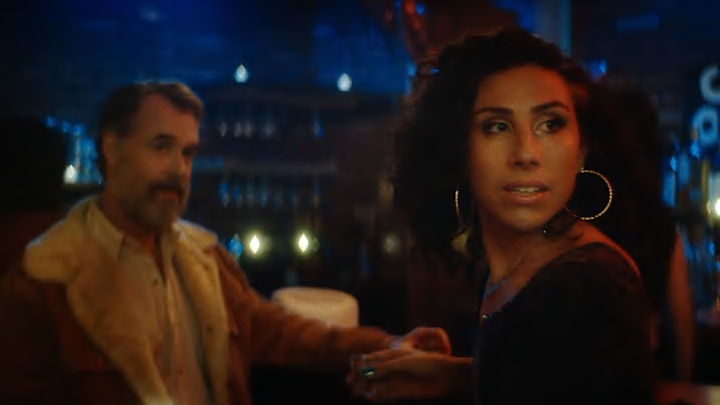Valentine's Day is rarely a place for straightforward romantic passion in the movies. More likely, it's the backdrop for masked miners to slaughter people or the haunting events of Picnic at Hanging Rock. Director Esteban Arango and writer/star River Gallo's Jersey-set crime thriller Ponyboi continues that trend with aplomb. As this title begins in the early 2000s, intersex sex worker Ponyboi (Gallo) is commiserating over friendship bracelets and jokes with pregnant best pal Angel (Victoria Pedretti). The good times grind to a halt when Angel's gangster husband Vinnie (Dylan O'Brien) shows up at his laundromat headquarters. The untrustworthy Vinnie isn't just Ponyboi's pimp, but also sleeping with Ponyboi behind his wife's back.
In his behavior, Vinnie comes off like Jesse Pinkman cosplaying as a Sopranos character. However, he clutches grand ambitions involving a unique strain of crystal meth and a high-profile gangster that can give Vinnie all the connections he desires. Ponyboi is forced to sleep with this famous gangster, but that scenario quickly goes south. Gravely south. Now, Ponyboi is on the run and desperately needs to get hold of testosterone hormones before leaving Jersey forever. Inevitably, Vinnie discovers what’s going on and plans to kill Ponyboi to save his skin.
Ponyboi occupies a seedy, corrupt world where folks like Vinnie often have an inexplicable level of power. However, that doesn’t mean Arango and cinematographer Ed Wu lean on a generic, drab aesthetic to accentuate a slimy aesthetic. On the contrary, Ponyboi is rife with scenes coated in vividly colorful neon lights. The laundromat where the story begins is lathered in colder, blue hues. However, when handsome empathetic Vegas cowboy Bruce (Murray Bartlett) strolls into Ponyboi’s life, golden-tinted lighting creeps into the frame.
A one-on-one diner conversation between Bruce and Ponyboi especially utilizes these warm glows to suggest an island of comfort in a sea of uncertainty. Traces of a sickening green, meanwhile, permeate Vinnie’s meth-packed basement while pink shades dominate the laundromat space where Ponyboi gets intimate with clients. Arango and Wu aren’t afraid to embrace heightened, colorful reflections of tone and character motivations. The result is a visually vibrant exercise keeping viewers constantly guessing what shades will materialize next. To boot, this facet gives Ponyboi a distinctive identity compared to other low-budget crime thrillers of its ilk.
Gallo's screenplay nicely compliments the pleasantly neon visual scheme with equally thoughtful and tonally varied writing. Gallo’s writing often leans on the propulsive intensity of a Safdie Brothers film. Keith William Richards from Uncut Gems (and this year's excellent Eephus) even shows up as antagonistic gangster Two-Tone. However, they pair those Good Time-inspired tendencies with slower-paced, dialogue-driven digressions where Ponyboi confronts people from his past like Charlie (Indya Moore). Impressively, tension and simmering chats make for a solid combination in Gallo’s hands, partially because they effectively paint how Ponyboi’s world can turn into a nightmare on a dime.
That tonal balance is also achieved through having Vinnie as a constant source of potential conflict. If Vinnie suddenly paused every five minutes to monologue, then Ponyboi’s sense of internal strife would dwindle. With this wannabe gangster always on the hunt for Ponyboi, though, there’s consistent palpable danger even as Gallo’s writing carves space for vulnerability between this universe’s characters. This includes lovely early scenes of Ponyboi bonding with Angel or two other sex workers. Such displays of warm connections provide a tragic reminder of the freer lives these characters could have if forces like societal stigmas and capitalism didn’t exist.
Granted, some of these dialogue-heavy scenes lean too heavily on ham-fisted verbiage jostling one right out of the movie. Generally, though, Gallo’s most intimate Ponyboi scenes reverberate with sharp writing that isn’t usually found in other crime thrillers. Similarly absent from Ponyboi’s contemporaries is this title’s forays into bittersweet poignancy. Ponyboi has a complicated relationship with his past. Those yesteryear events include everything from sunny walks on the pier with his parents to getting forced into doctor visits meant to “cure” his intersex identity.
Once again, Arango and Wu display welcome visual dexterity in these flashbacks. Largely told through point-of-view shots from an adolescent Ponyboi, sequences of Ponyboi’s dad handing his child a knock-off My Little Pony doll are coated with golden, bright hues. Shakier camerawork and dimmer lighting, meanwhile, permeates glimpses into those horrible days spent on a surgery table. Embracing such vivid and varied imagery renders Ponyboi’s past with as much nuance as the character’s personality. As a screenwriter, Gallo wisely keeps dialogue in these sequences to a minimum. Viewers hear only fragments of what doctors and Ponyboi’s parents say in both good and bad times. This further accentuates the realism of these memories, which are imperfectly incomplete.
As both a lead performer and screenwriter, Gallo demonstrates impressive levels of talent. They’ve got an engaging screen presence instantly making one latch onto Ponyboi. Plus, Gallo’s willingness to make Ponyboi’s titular character as messy as any other crime thriller protagonist provides an exciting departure from the “model citizens” so many LGBTQIA+ cinematic figures must adhere to. Why must cis-het characters get all the morally dubious fun? Dylan O’Brien, meanwhile, displays an impressive believability as slimeball Vinnie. This Maze Runner veteran effortlessly sheds memories of his Teen Wolf/YA-novel adaptation days with his lived-in physicality. Watching Vinnie, one isn’t constantly reminded of O’Brien expanding his range as an actor. You just see the character Vinnie, an impressive accomplishment.
Ponyboi reaffirms once again that Valentine’s Day is never safe in the realm of motion pictures. Filmmakers and screenwriters are always shouting “I defy you, heart man!” to the sky as they deliver darker narratives about a holiday focused on chocolates and hearts. Thank goodness for that reality since it produced Ponyboi, a breath of fresh air in modern indie crime thrillers. Whether it’s the lighting or deftly nuanced script (which executes both vulnerability and tension with ease), Ponyboi’s grim vision of New Jersey Valentine’s Day madness is irresistible.
